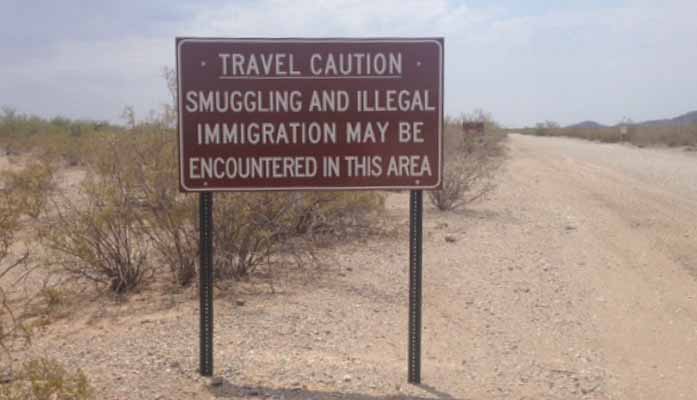
by Daniel Stefanski | Jan 22, 2024 | News
By Daniel Stefanski |
Arizona Republican legislators continue to work alongside state attorneys general in significant legal fights in federal court.
On Friday, the Arizona State Senate Republican Caucus announced it had joined an amicus brief to the Supreme Court of the United States in Trump v. Anderson, defending the former president’s right to remain on the ballot in Colorado – and every other state – for the upcoming election. This action follows a similar effort, where legislators, led by Senate President Warren Petersen and House Speaker Ben Toma, signed their names to a brief that successfully petitioned the nation’s high court to hear the case.
This latest amicus was led by the States of Indiana and West Virginia and co-signed by twenty-three additional states. Notably, the legislative leadership of North Carolina also joined the coalition of attorneys general and the Arizona Legislature in the filing. As with Arizona, North Carolina has a Democrat attorney general and a Republican-led legislature.
Senator Jake Hoffman championed the newest sign-on from the state legislature, writing, “With a Leftist AG in Arizona who refuses to stand up for the rule of law, the conservative-led Legislature has stepped up to defend not only the laws of our state, but the very fabric of our republic. Proud to stand with Warren Petersen and the Arizona Senate Republicans on these legal battles.”
Representative Alexander Kolodin added, “Democrats are trying for a Chinese style election where only their presidential candidate appears on the ballot. The Arizona House and Senate Republicans are stepping up to defend democracy against this threat!”
In their brief, the attorneys general and legislators warn that “if the Court endorses what happened in Colorado, then the chaos can only be expected to worsen. No doubt a political tit-for-tat will ensue, in which competing parties will find new avenues to disqualify their opponents. And elections could then come down to small variations among state elections laws and the political composition of state administrations. In short, indulging challenges of this sort and in this posture will ‘sacrifice the political stability of the system’ of the Nation ‘with profound consequences for the entire citizenry.’ At a minimum, it will ‘expose the political life of the country to months, or perhaps years, of chaos.’”
The legislators’ sign-on to this brief marks yet another time they have joined Republican attorneys general on their legal filings over the past couple months. At the start of the year, the Arizona Legislature joined an amicus brief in federal court to help challenge California’s Assault Weapon Control Act. That brief was led by the attorneys general of Idaho, Iowa, and Montana, and co-signed by almost two dozen additional states.
In December, Petersen and Toma joined a public comment letter to the Bureau of Alcohol, Tobacco, Firearms and Explosives (ATF) to address its newly proposed rule, Definition of “Engaged in the Business as a Dealer in Firearms.” That letter was led by the States of Kansas, Iowa, and Montana, and co-signed by 22 other attorneys general.
Over the past month, the two Republican legislative leaders have signaled a more aggressive shift in taking the reins from Arizona Attorney General Kris Mayes to defend the law and Constitution. Attorneys general are not usually joined by outside parties on their amicus briefs, yet multiple coalitions of Republican state prosecutors have included Petersen and Toma on these major filings. In previews for the 2024 legislative session, both the House and Senate Majority Caucuses indicated more of these efforts are to be expected throughout this year.
Daniel Stefanski is a reporter for AZ Free News. You can send him news tips using this link.

by Daniel Stefanski | Jan 21, 2024 | News
By Daniel Stefanski |
A surprisingly controversial bill from 2023 cleared its first hurdle this week at the Arizona Legislature.
On Wednesday, HB 2042 (“The Tamale Bill”), sponsored by Representative Travis Grantham, passed the House Regulatory Affairs Committee with a 6-0 vote. According to the overview from the Arizona House, this bill would “expand the foods that meet the exemption for cottage food products if requirements are met, and establish program guidelines and requirements.”
The Arizona Department of Health Services (AZDHS) oversees the cottage food program. Its website states this program “allows individuals to make homemade products that are neither potentially hazardous nor Time or Temperature Control for Safety Foods, and offer them for commercial sale.” According to AZDHS, the law was amended twice – once in 2011 and another in 2018. The 2011 change “allow[ed] residents to produce non-potentially hazardous baked and confectionery products in their homes and offer them for commercial sale within the state.”
In a statement to AZ Free News, Grantham said, “I’m glad it passed committee unanimously and I hope the governor will sign it into law this time.”
Grantham’s reference to the governor’s future action harkens back to the 2023 legislative session, when Katie Hobbs vetoed the bill after overwhelmingly bipartisan support in both the House and Senate. In her April 18th veto letter to Speaker Ben Toma, Hobbs gave several reasons for her decision, including that the proposal “would significantly increase the risk of food-borne illness by expanding the ability of cottage food vendors to sell high-risk goods.” After the governor’s veto, the Arizona State Legislature attempted to override the action, but fell five votes short in the House of Representatives.
The President of the National Hispanic Caucus of State Legislators (NHCSL), Nellie Pou, wrote a letter to Senate President Warren Petersen and Speaker Toma after Hobbs’ decision last year, supporting the “efforts to override the Governor’s veto.” Pou expressed disappointment in Hobbs’ veto, writing, “By signing this bill, the Governor had an opportunity to support the Hispanic community and personal freedom that should be accessible to everyone. Our community should not fear legal repercussions for selling their homemade foods.”
Democrat State Representative Alma Hernandez also made clear her disappointment over the spring 2023 veto. Hernandez said, “As a public health professional, I am VERY disappointed to see that a bipartisan bill allowing Arizonans to make an honest living by selling things like tamales, tortillas, and sweets legally was vetoed by Gov. Katie Hobbs. It makes no sense.”
After Senate Democrats released a statement to announce that they would not provide “the required votes needed to override” the governor’s veto of the bill, Arizona Republic columnist Laurie Roberts took the legislators to task, saying, “Senate Democrats’ change of heart on the tamale bill isn’t about protecting the people from imagined illness. It is all about protecting a governor from embarrassment.”
Hobbs may now get a second chance at “redemption” if the bill were to clear both chambers for the second year in a row. The 2024 version does include some changes in hopes that the Governor’s Office will be more receptive this time around.
Representatives from the Institute for Justice – AZ Chapter, Barry Goldwater Institute for Public Policy Research, Arizona Free Enterprise Club, Arizona Craft Producers, North Phoenix Chamber of Commerce, and Americans for Prosperity – AZ, indicated their organizations’ support for The Tamale Bill as it commences another legislative journey. The Arizona Restaurant Association remains neutral on the proposal.
Daniel Stefanski is a reporter for AZ Free News. You can send him news tips using this link.

by Daniel Stefanski | Jan 19, 2024 | News
By Daniel Stefanski |
Arizona Republicans are gearing up for the November General Election.
Last week, the Arizona Republican Party announced that it had “set another record-breaking fundraising quarter under the leadership of Chairman DeWit.”
The press release transmitted from the AZGOP highlighted that state Republicans had “raised $670,345.91 from over 7,564 individual donors” in the 2023 fourth quarter.
In a statement accompanying the announcement, AZGOP Chairman Jeff DeWit said, “As the AZGOP’s leadership, we are fully committed to core Republican values. We are tirelessly raising funds and actively recruiting dedicated Republicans to run for office. Our focus includes increasing republican voter registration, fiercely protecting election integrity, opposing bad initiatives like ranked choice voting, and building a massive get-out-the-vote machine. We are thankful to our wonderful donors who recognize the impactful efforts of the AZGOP, and we are working hard to use those dollars as effectively and efficiently as possible.”
The AZGOP noted that the 2023 Q4 fundraising haul was significantly higher than quarters for “similar periods in past election cycles, subtracting Republican National Committee transfers to show actual donation numbers.” Its news release asserted that the party brought in $186,621.59 in the fourth quarter of 2015, and $340,436.39 in the fourth quarter of 2019.
DeWit and his team will need every possible penny from donors in advance of the onslaught of significant campaigns later this year. Arizona is a high stakes swing state in the 2024 Presidential contest, and the eventual Republican nominee will likely require the state’s 11 electoral votes if he (or she) is to capture the White House. The Grand Canyon State will also feature one of the nation’s most competitive U.S. Senate races, and both major political parties will be vying for control of the state legislature, where Republicans hold very narrow majorities in both chambers. In addition, there may very well be multiple ballot measures for voters to consider in November (one of which is an abortion amendment), that could permanently change the state’s DNA.
Daniel Stefanski is a reporter for AZ Free News. You can send him news tips using this link.

by Daniel Stefanski | Jan 19, 2024 | News
By Daniel Stefanski |
Last week, Ali Bradley, a National Correspondent for NewsNation, revealed news that the Lukeville Port of Entry had shut down for a brief time. Bradley attributed the closure to “violence in Mexico” due to “fighting/gun battles within the cartel,” per her sources.
Bradley stated that “the Sinaloa cartel runs operations on the other side of the border, (and) a Mexican National Guard soldier was killed in a gun battle at the end of last month.”
Art Del Cueto, the Vice President of the National Border Patrol Council, has also raised awareness of increasing cartel violence on the Mexican side of the border. At the end of 2023, he thanked “Mexican media reporting on the mass cartel war that has erupted just south of our borders.” He added, “12 cars destroyed, 20 deaths. 5 cars that were bulletproof. This is the intel agents and the people near the border need to be receiving. Unfortunately, many individuals involved in the cartels can freely come into the US and ask for asylum.”
Del Cueto posted two additional updates in recent days. On one, he broadcasted audio of a gun fight in Sonoyta Sonora, saying, “It ain’t no joke down there. The war continues…It’s not about the human smuggling the problem is much bigger than that.”
Then, Del Cueto shared another video of “more heavy gun fighting as a battle ensued in the town of Magdalena De Kino just south of Nogales.” The veteran border patrol agent asserted this cartel violence had become “a daily occurrence throughout different parts near the U.S.-Mexico border.”
The temporary shutdown of this port of entry comes after Lukeville experienced a much lengthier closure, which started December 4, 2023, and ended January 4. In announcing the reopening of the port, U.S. Customs and Border Protection promised “to continue to prioritize our border security mission as necessary in response to this evolving situation…(by) assess(ing) security situations.”
Despite the Biden Administration moving to reopen the Lukeville Port of Entry, some Republicans still wanted to address the root of the crisis. Arizona State Senator T.J. Shope was one of those officials, as he called the initial action to close the vital border crossing “irresponsible and reckless.” Shope also said, “Not only did this create financial turmoil for border communities within Arizona who rely on the tourism traffic to and from Rocky Point to support their families, but the closure of the Lukeville Port of Entry also put unnecessary stress and strain on our citizens and commerce who depend on a safe and direct route to this popular destination.”
Over the past year, legislative Republicans have effectively made the point that the reality for Arizonans could be more daunting if not for their check on the Democrats in the state – especially Governor Katie Hobbs. When Hobbs signed the state budget compromise in May, Senate President Warren Petersen highlighted that his members “prevented the Governor and Democrat Legislators from advancing their extremist agenda…we’re not getting rid of state funded border security resources to keep our communities safe.” Republicans are expected to continue to introduce bills and policies in this current legislative session that would give the Grand Canyon State more ability and resources to combat the many scourges of the border crisis.
Daniel Stefanski is a reporter for AZ Free News. You can send him news tips using this link.

by Daniel Stefanski | Jan 18, 2024 | News
By Daniel Stefanski |
Arizona’s leading legislative Republicans are cheering on the nation’s high court as it agreed to hear arguments in a significant case of interest to the state.
Earlier this month, the General Counsel for the Arizona House Republicans, Linley Wilson, announced that the Supreme Court of the United States had granted cert in City of Grants Pass, Oregon v. Johnson and Logan. Senate President Warren Petersen and House Speaker Ben Toma had filed an amicus brief at the Court in September 2023 in the matter concerning “three homeless individuals in Grants Pass (who) filed this lawsuit to try to stop local and state governments from combating the public safety threats, the public health dangers, and the inhumane conditions associated with these homeless encampments.”
The city had received unfavorable opinions from the federal courts at both the district and appeals (Ninth Circuit) levels, leading to the appeal to the nation’s high court.
In their brief, Petersen and Toma asserted that “the Legislature also has a pressing interest in homelessness because it confronts the realities of America’s homelessness crisis every day, including only a few blocks from the state capitol complex. Phoenix, Arizona, is home to one of the nation’s largest homeless encampments, commonly known as ‘The Zone.’ With hundreds of homeless residents, The Zone is a place of intense poverty, frequent crime (including multiple homicides), social instability, and poor living standards.”
The lawmakers also opined, “the Ninth Circuit decided it was better at making policy than elected state legislatures and city councils.” They argued the opinion from the Ninth Circuit “injects the federal courts into a policymaking area reserved for state and local lawmakers, entrenches a plainly incorrect and deeply damaging construction of the Eighth Amendment, and improperly interferes with state and local policymaking on the critically important issue of homelessness.”
Wilson previously pointed to a social media post from California Governor Gavin Newsom about the issue of federal courts inserting case law into “local efforts to clear street encampments,” stating, “This humanitarian crisis is not a partisan issue. The 9th Circuit’s opinions harm the homeless and the Legislature’s ability to craft effective policies.”
According to Amy Howe of SCOTUS Blog, this case will likely be heard before the Court in April.
Daniel Stefanski is a reporter for AZ Free News. You can send him news tips using this link.





